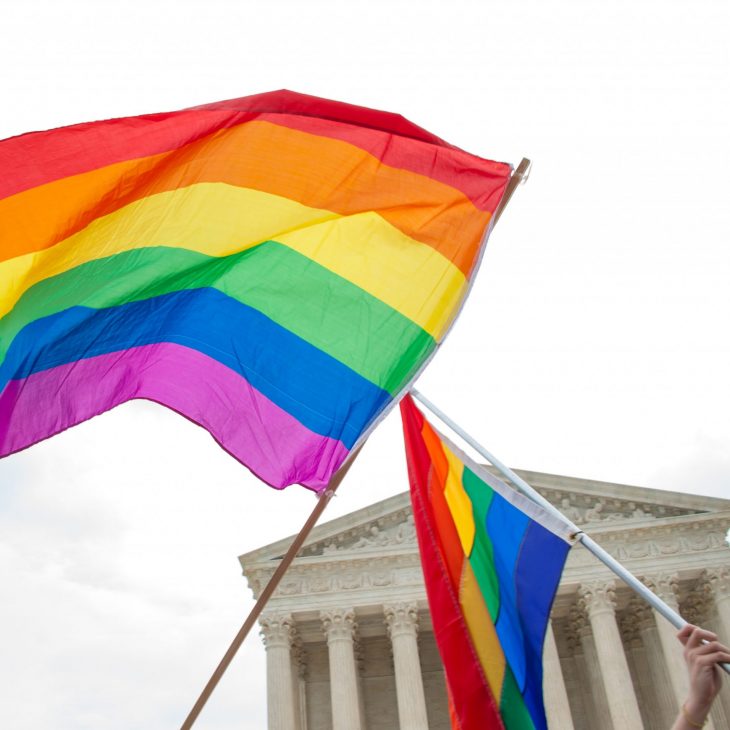
The core values at the center of the American experiment are the freedom of religion and the freedom of speech. The freedom to practice one’s religion and express one’s beliefs and opinions without fear of government intervention or penalty is one of the hallmarks of American democracy.
However, in recent years there have been important questions raised about the extent of an individual religious freedom and free speech, particularly when the freedom of religion leads to discrimination against another person or group of people.
Today, the Supreme Court will hear yet another case dealing with this question. An evangelical Christian website designer from Colorado is suing the state on the basis that she could potentially be sued for refusing to build a website for an LGBTQ+ couple’s wedding which she claims would compromise her freedom of religion since her evangelical faith deems LGBTQ+ marriage as sinful. Many such cases have popped up across the country over the past 10 years, raising the fundamental question: To what extent does freedom of religion and free speech cover businesses? Should businesses, offering services to the public, be allowed to turn away individuals simply because they don’t agree with some aspect of their identity or beliefs?
Admittedly, this is a most complicated question. The conservative argument is that an individual’s business is an extension of the individual, and to force a business owner to create a product or perform a service for something their religion deems as immoral is an affront to their freedom of religion. The progressive argument asks to what extent such discrimination should be allowed. If one can discriminate against LGBTQ+ people, then can one also discriminate on the basis of race, gender, or religion? Progressives argue that when one decides to open a public business, they should be held to the same standards as all other public institutions which prohibit discrimination based on “protected classes” such as gender, race, religion, and sexuality.
For our pluralistic nation to function and flourish, it requires that we learn to live alongside those we disagree with.
As an LGBTQ+ person and a Christian pastor, I feel this tension acutely. I can sympathize with my evangelical friends who do not want to feel forced to create websites, cakes, or offer services to celebrate a wedding, for instance, that they feel violates their religious beliefs. At the same time, I know all too well what it feels like to be discriminated against because of my sexual orientation. This tension is one that must be acknowledged for its complexity, but none the less I believe there is a clear answer to this complex question.
For our pluralistic nation to function and flourish, it requires that we learn to live alongside those we disagree with. This goes beyond mere tolerance and extends to learning to be a good neighbor to people we do not see eye to eye with. Jesus himself taught that this was the heart of what it meant to be a faithful Christian. In the Gospel of Mark 12:30-31, Jesus says:
‘Love the Lord your God with all your heart and with all your soul and with all your mind and with all your strength.’ The second is this: ‘Love your neighbor as yourself.’ There is no commandment greater than these.
“Love your neighbor as yourself” is not a command that’s unique to Christianity — virtually every religious tradition has some version of this teaching at the heart of its ethics. Notice, again, that this isn’t a call to merely tolerate and allow your neighbor to freely exist, but actually extends beyond that, calling us to learn to “love” those who are different than us. The Christian tradition defines love as self-sacrificial service to others, setting aside our own comfort and desires to benefit others. This sort of neighborliness is what is needed for a pluralist democracy to flourish.
Which brings us back to religious business owners and their potential LGBTQ+ clients. For the good of our pluralist democracy, we must be willing to serve and do business with those whom we disagree with. In reality, every business does this anyways already; I am not aware of any business owners who do a moral and religious assessment of each customer’s lives and beliefs before doing business with them. To do so would severely limit the success of said business and would rightly be condemned by most people as discriminatory and contrary to the “neighborly” behavior that our democracy requires.
The question of whether a business has the same rights as an individual is legally complex, and the Supreme Court is likely to spend a great deal of time and debate on this case. But for me, the question transcends any legal argument that can be rendered and takes us to the heart of who we’re seeking to be as the United States of America. Do we want to be a country that is known for allowing rampant discrimination, where anyone could be turned away at any business at any time because of some aspect of their identity? Or do we want to continue to shine as a beacon of diversity, enriched by our willingness to embrace our neighbors of different beliefs, identities, and values?
This is the central question of this most polarized era of American history, and it seems to me that if our pluralistic democracy is going to continue to survive and thrive, there is only one path forward: choosing to be a good neighbor to each and every person that calls America home.
Share
Related Articles
American Civic Life
American Civic Life
Is This a Time for Bridgebuilding? 5 Leaders in Conversation
American Civic Life
We Commemorate, We Commit: Out of Catastrophe, a Conversation on Connection and Repair



